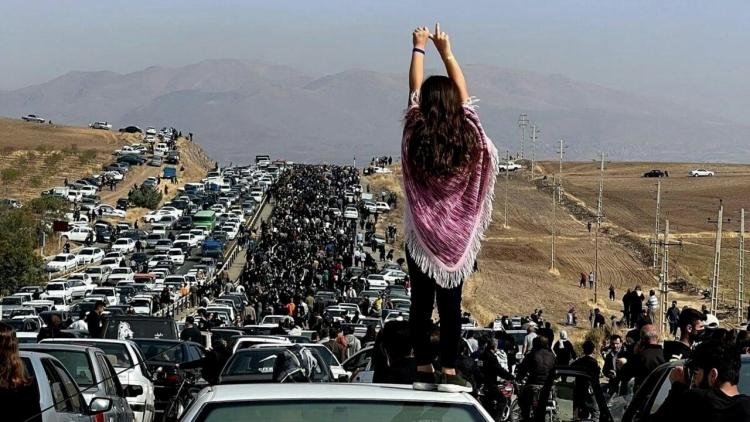
The Idea of Iran: Qajar Iran on the cusp of modernity

Key information
- Date
- to
- Venue
- Brunei Gallery, SOAS
- Room
- Brunei Gallery Lecture Theatre (BGLT)
- Event type
- Conference
About this event
The nineteenth century saw the consolidation of the Qajar State and changed relations with the European powers that had been transformed by political, industrial and agricultural revolutions, among them the loss of Britain’s American colonies and the rise of an independent power on the global scene.
When Iran emerged from its own turbulent eighteenth century, it entered a new world dominated by expanding colonial and imperial forces, notably Britain and Russia. Among the many consequences were the remorseless losses of territories in the North and East, by the end of which Iran took on the outlines of its present borders. At the same time, the encounter with the West gave rise to dissatisfaction, realisations of weakness, many calls for change and ultimately, revolution.
What does the Idea of Iran mean at this period? Can we discern the ways that the Iranians viewed their traditions and their environment (natural and built), their own literature and history, their religious identities, their relations with the increasing number of foreigners? And what was the view of these outsiders, in this period that was so formative of the West’s idea of Iran? What did Iran look like? How does modern scholarship define the distinctive aspects of the period? These are some of the questions we hope to explore in the symposium dedicated to this complex and difficult period from which Iran emerged with a new, secular and nationalist regime that sought to bring the country into line with these outside forces in the twentieth century.
PDF document, 6.43MB
Registration
Tickets are £10 and can be purchased via the SOAS online store. If you are attending on both days, a discounted rate of £15 is available. SOAS students and staff can attend for free. You will need to be logged into your SOAS account to register.
Please note that ticket sales end at 1.00pm on Friday 10 May 2024 and can only be purchased online. It will not be possible to purchase tickets at the symposium.
Programme
Saturday 11 May 2024
| Time | Session |
|---|---|
| 9:00am | Arrival and registration |
| 10:00am - 10:15am | Welcome and introduction |
| Session 1: The ‘discovery’ of ancient Iran and its treasures | |
| 10:15am - 10:55am | Lindsay Allen (KCL, UK), Material culture and the construction of Iranian antiquity |
| 10:55am - 11:35am | Alyson Wharton-Durgaryan (Lincoln, UK), Armenians and Ideas of Iran: Dikran Kelekian, Kirkor Minassian and Hagop Kevorkian’s sourcing of Persian portable arts and their dealings with European and American museums at the turn of the twentieth century |
| 11:35am - 11:55am | Break |
| Session 2: Foreign and Persian perceptions of Iran | |
| 11:55am - 12:35pm | David Motadel (LSE, UK), The Shah’s Grand Tours: Global monarchy in the age of empire |
| 12:35pm - 1:15pm | Charles Melville (Cambridge, UK), Communications and the circulation of news in nineteenth-century Iran |
| 1:15pm - 2:00pm | Lunch break |
| Session 3: The visualisation of Iran | |
| 2:00pm - 2:40pm | Maryam Ekhtiar (New York), Qajar still-life painting in context |
| 2:40pm - 3:20pm | Layla Diba (New York), An Iranian artist abroad: Mohammad Ghaffari Kamal al-Molk’s European tour and the evolution of the modern Iranian landscape |
| 3:20pm - 4:00pm | Mira Schwerda (Edinburgh, UK), The Revolutionary portrait: Aesthetics, politics and the relationship between photography and painting in the Constitutional Period |
| 4:00pm - 4:20pm | Break |
| Session 4: The shrinking borders to east and west | |
| 4:20pm - 5:00pm | Charlie Gammell (UK), Qajar Herat; Persian, Sunni, Pashtun and Shi‘a. Questions of identity and belonging in nineteenth-century Herat |
| 5:00pm - 5:40pm | Sabri Ateş (SMU), The transformation of the Ottoman–Iranian frontiers |
| 5:40pm - 6:00pm | Closing remarks |
Sunday 12 May 2024
| Time | Session |
|---|---|
| 9:45am | Welcome and introduction |
| Session 5: The view from the peripheries to north and south | |
| 10:00am - 10.40am | Houri Berberian (Irvine, USA), The role of Armenians and Georgians in Caucasian–Iranian connections |
| 10:40am - 11:20am | Alexander Jabbari (Minnesota), Bazgasht and after: Conceptions of Iran in a literary context |
| 11:20am - 11:40am | Break |
| Session 6: Iran as a trading partner | |
| 11:40am - 12:20pm | William Bullock Jenkins (London, UK), Tariffs, treaties, trade: Qajar Persia’s economy and commercial integration under nineteenth-century global conditions |
| 12:20pm - 1:00pm | Ali Gheissari (San Diego, USA), The Idea of Commerce and its configurations in Qajar Iran: Domestic and transregional contexts |
| 1:00pm - 1:45pm | Lunch break |
| Session 7: Politics and reform | |
| 1:45pm - 2:25pm | Stephanie Cronin (Oxford, UK), Britain and the ‘Persian Empire’: Iran through a Classical lens |
| 2:25pm - 3:05pm | Jennifer Jenkins (Toronto), German diplomacy and Iranian nationalism during the Constitutional Revolution |
| 3:05pm - 3:45pm | Robert Gleave (Exeter, UK), Religious developments in Qajar Iran: Scholarly authority and the Qajar state |
| 3:45pm - 4:00pm | Closing remarks |





